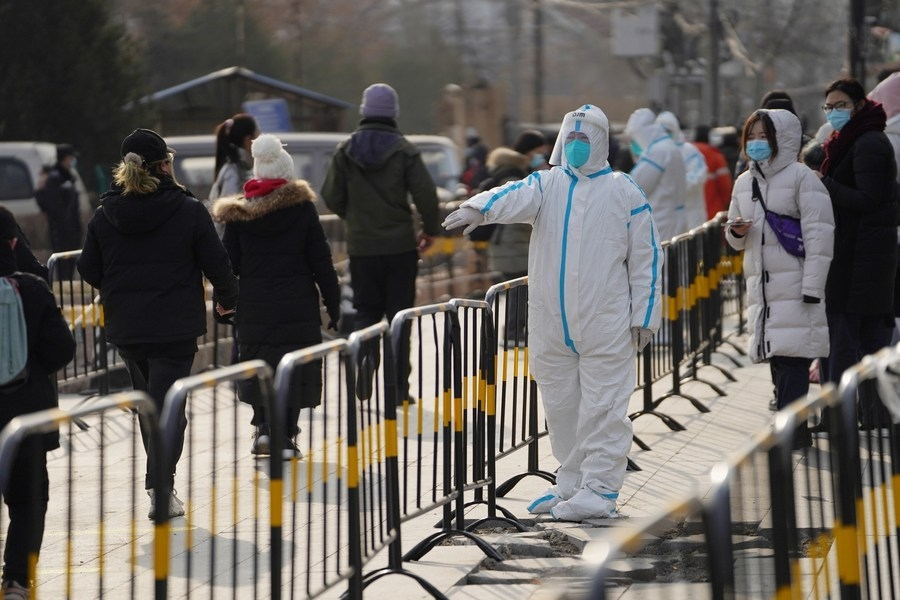A World Health Organization (WHO) team was finally allowed to get down to field work in Wuhan today even as a war of words began between the newly-formed Biden administration and the Chinese government over the scope of probe into the origins of Covid-19 pandemic.
The WHO fact-finding mission emerged from the hotel after completing a 14-day quarantine to begin their origin-tracing mission in the city where the deadly virus – which has infected over 100 million people worldwide and claimed lives of more than two million – was first detected in December 2019.
Beijing had for long been opposing WHO's decision of sending experts to China saying that it should conduct similar trips to other countries and regions.
On Thursday, as the WHO team was shifted to another location in the city from their quarantine hotel, the media was kept at a distance. The Chinese Foreign Ministry, without revealing the places they will be allowed to visit, said that the team will carry out exchanges, including having discussions and field trips. It further stated that all their activities will "need to be science-based" with the utmost priority of preventing future risks and protecting people's safety and health.
Foreign Ministry Spokesperson Zhao Lijian also said today that it would be inappropriate to make "any negative speculation and politicized interpretation" of the mission.
"They will cause undue disruption to the expert panel's scientific cooperation in China and is not conducive to drawing a serious, science-based conclusion," Zhao said.
The spokesperson was responding to a question on the United States demanding a robust and clear international probe into the origins of Covid-19
Jen Psaki, the White House press secretary, had yesterday highlighted "great concern" over the misinformation" from "some sources in China."
"It's imperative that we get to the bottom of the early days of the pandemic in China, and we've been supportive of an international investigation that we feel should be robust and clear," she said adding that the new government will continue to work with the allies to evaluate the report's credibility on the investigation once it's done.
China insists that origin-tracing is a complex scientific matter that requires international research and cooperation by scientists across the globe.
"We hope the U.S. side will work with China, take on a responsible attitude and respect facts, science and the diligent work of WHO experts, so that they can research on origin-tracing free from any political disturbance," Zhao commented today.
While many experts believed that Covid-19 came from bats in the Wuhan seafood market, various reports had also cited last year that it had escaped, or may have been deliberately released, from the Wuhan Institute of Virology – a theory which was supported by former US President Donald Trump.
At a White House press conference last May, Trump refused to believe that SARS-CoV-2 had occurred naturally. When asked what gave him a "high degree of confidence that the virus originated from the Wuhan Institute of Virology", Trump replied "I can't tell you that. I'm not allowed to tell you that."
Doubts, however, persist if the WHO probe will actually yield any conclusive results.
"It has taken them an entire year to negotiate access in any meaningful way in China," Lawrence Gostin, a professor of global health at Georgetown University told The Washington Post, earlier this month.
"It's like there was a murder and you go back to the crime scene a year later, after it was scrubbed, and you expect to find something," he said.
Earlier this week, an AFP report from China had revealed that the Chinese authorities have deleted a social media group of relatives of Wuhan's coronavirus dead and are pressuring them to keep quiet till the WHO team is in the city.
The WeChat group was used by 80 to 100 family members over the past year and was suddenly deleted without explanation about 10 days ago.
"This shows that [Chinese authorities] are very nervous. They are afraid that these families will get in touch with the WHO experts," the news agency quoted Zhang, 51, whose father died early in the outbreak of suspected Covid-19, as saying.
As Keiji Fukuda, a public health expert at the University of Hong Kong and former WHO official, said a few days ago: "It all comes down to what will the team have access to. Will they really be able to ask the questions that they want to ask?"




















